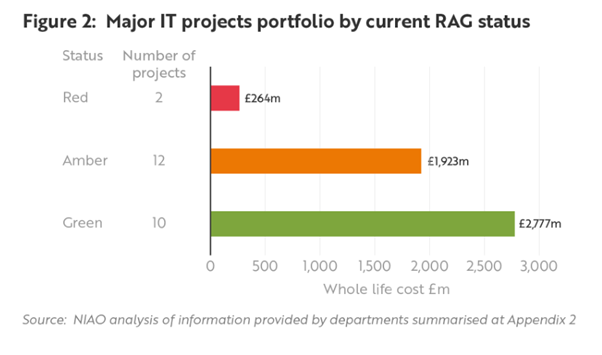
By Geoff McGimpsey, the owner of Foundry Marketing Partners.
Public procurement in Northern Ireland is one of our most powerful, underused levers for economic growth.
Every year, billions flow through public contracts, yet our system remains stuck in a cycle of compliance and caution. A recent Northern Ireland Audit Office report on major IT projects contained alot of hard truths, perhaps the greatest of which is that procurement is not being treated as a strategic investment tool that could drive innovation, jobs, and economic growth.
Procurement isn’t just a process. It’s a strategy. It’s an extension of how a government realises its vision for the future. Procurement could be used to shape how we adopt AI, how we build better public services, and how we create the conditions for indigenous firms to thrive.
So why aren’t we using it that way?
Major IT Projects in Northern Ireland
The Northern Ireland Audit Office (NIAO) always produces report that are clear, accessible and direct, not to mention forensic. Freighted with detail and lessons to be learned, these are valuable documents for industry, local government and the private sector alike to delve into.
All are worth reading, but last month’s ‘Major IT projects in Northern Ireland’ contained much of interest. It was an analysis of procurement for IT contracts from over the past three years where the contract value was £25m and above. Having worked in the IT sector for some time now, this report was one that I had been waiting for.
The report is 93 pages long, but the NIAO deploys an economy of language - it doesn’t use three words when one will do, and is also bereft of jargon. It’s crammed full with insight.
The Value of Procurement
Public procurement here is worth between £2.2 and £4 billion a year in annual expenditure, and is usually distributed across 5,000 contracts. Around 25 per cent of the total resources available to the Northern Ireland Executive are used for procurement.
Not insignificant, but smaller than our Celtic brethren - in Wales it’s approximately £10bn or 33% of total available expenditure. If you look to Ireland, 31% of total expenditure is devoted to procurement. If we addressed issues in procurement and implemented a procurement strategy, more would take place and greater investment in the local economy would occur.
Failing to improve the system has a sincere economic cost. If we upped procurement expenditure by another 5% (to just below Wales and Ireland), it would add another £800m of public investment to the local economy. As an economic stimulus, this is greater than the £730m the government poured into PEACE Plus which it launched with great fanfare in 2023.
A Strategic Capability - Not A Compliance Exercise
Comptroller and Auditor General (C&AG) for Northern Ireland Dorinnia Carville states in the report that: “Across 29 major IT projects worth £5.2 billion, we're witnessing the consequences of procurement treated as a compliance exercise rather than a strategic capability.”
This view has echoes in the Modern Industrial Strategy which recommends the UK: “Use government’s procurement power to strengthen domestic supply chains and support good quality local jobs, while shaping markets for innovation in the longer term.”
Procurement (particularly in the age of AI) is a strategic investment tool. But we’re focused on compliance rather than driving investment and innovation.
We are doing procurement in the wrong way. We all know it. Yet change does not occur.
But even if we measure the success of our procurement market as a compliance and risk aversion exercise, we’re still getting it wrong. The NIAO found that almost 60% or £2.2bn of IT projects are red or amber.

Fit for purpose?
All the way back 2013 a report by the Strategic Investment Board relating to the procurement of major infrastructure found that the procurement system was “not fit for purpose and works against our best endeavours to deliver”.
The NIAO and the Northern Ireland Assembly Public Accounts Committee has been looking into procurement of various shades for years now. And the same things keep coming up.
The NIAO’s 2023 report Public Procurement in Northern Ireland concluded, “It is common for large scale procurement exercises to be delivered late and to cost more than expected”, before adding:
“Various investigations into procurement failures often highlight the same underlying issues affecting performance. These include a persistent culture of undue risk aversion that can distort and delay procurement decision making, and concerns about the overall level of commercial capacity and capability across the public sector.”
The NI Assembly Public Accounts committee produced a report on public procurement in Northern Ireland last November. The Committee said it was "disappointed... (by) the absence of a specific strategy which should establish and clearly articulate the high-level objectives that public procurement is working towards the achievement of."
On pg8, the report says: "The Committee remains unconvinced by evidence provided that the current structures used to deliver procurement in Northern Ireland are sufficient to meet the challenges faced and maximise the opportunities for efficient and effective procurement services."
That's fundamental stuff. Or in other words, 10 years after the SIB report and the procurement system here is still not fit for purpose.
An economic driver for growth
Given the level of expenditure involved, procurement has the potential to be a powerful driver for economic and social development and make a significant contribution to the achievement of the Executive’s wider policy agenda.
For example, planning has always been an issue here. Applications couldn't be submitted online until December 2022, almost 20 years after England had this capability. Not procuring for this earlier (and getting it right… because when we did procure it, we got it wrong) meant businesses paid the price in delayed developments and frustrated investors.
So it’s not just the missed opportunity to draw in fresh investment, but bad procurement has an opportunity cost totalling (at a low-ball guess) ten of millions.
All this, when the opposite should be true. Our smaller scale should create unique opportunities for the procurement innovation that larger jurisdictions can't implement.
Our size means we can be more agile than Whitehall. Our integrated government structure (should) mean fewer stakeholders to coordinate. Our existing relationships with a smaller pool of technology suppliers should mean faster, deeper market engagement and better market understanding.
Not so fast, private sector!
But step back for a moment and think about this from the perspective of the civil servant. If our civil servant procurers are risk averse, what made them this way?
Private sector suppliers might wag the finger, but they carry a considerable amount of the blame. The lower cost of going the legal route makes the Northern Ireland courts system relatively livelier, where suppliers that are more willing to challenge processes. In very complex frameworks or DPSs, a challenge even in a discreet part of the process could halt or derail the entire exercise.
I searched the courts portal for identifiable published decisions where procurement went down the legal path, and I found 26 examples. There are more cases that didn’t progress to court or went to meditation.
I make no comment on the merits of the cases listed, I’m simply pointing to their existence. If you’re a civil servant procurer, this list tells you to put compliance first and to avoid risk. From the perspective of the civil service, it must seem a bit thick for the private sector to complain about slow-moving risk averse processes when they themselves are contributing to the conditions that require civil servants to run risk averse processes.
A unified strategy
We need a central strategy. Instead, departments are building incompatible systems and are missing opportunities for shared platforms.
The opportunity is there to become the UK's leading example of how strategic procurement can drive public service innovation - and perhaps to lead the way on novel technologies which we’re good at... and which the Modern Industrial Strategy is committing big-spending government departments (like the MoD) to procure.
Reform and transformation of public services is one of the nine priorities for the 2024-2027 Programme for Government. Procurement is the thermometer that will tell you how healthy our commitment to reform and transformation truly is.
Smarter procurement could inject an additional £800 million annually into Northern Ireland's economy whilst simultaneously driving AI adoption, supporting local innovation, regional balance, good jobs and creating the conditions for indigenous firms to compete globally.
Sync NI's Summer 2025 magazine celebrates women in tech across Ireland as we continue to encourage more women to enter the thriving sector and address the current gender imbalance. Read the Summer 2025 Sync NI Magazine online for free here.